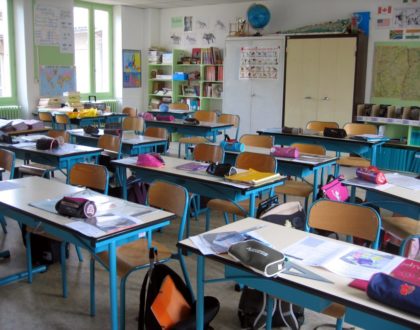Boston is Failing our Black and Brown Girls

For all its reputation as an innovation hub, the city of Boston has yet to grip the reality of racism and sexism that engulf every facet of the city. As we look further into this epidemic, we come to see that the most vulnerable victims are girls of color who often face higher rates of disciplinary action and discrimination in our schools. Our girls of color are feeling unsafe, unheard, persecuted and disconnected. It is time we address the racial disparities girls of color face in our schools.
40% of Boston-area female students are Latina; 37% of Boston-area female students are Black; and 12.5 % of Boston-area female students are White. Even so, Black girls make up 78% of school based arrests. On a national level, the trend continues: Black girls are seven times more likely than White girls to receive one or more out of school suspensions, four times more likely to be arrested in school, and over two and half times more likely to be referred to law enforcement. Latina girls were found to be one and half times more likely to receive an out of school suspension, get arrested at school, and referred to law enforcement. These statistics highlight disproportionate disciplinary charges against girls of color. How can we expect girls of color to fulfill their academic potential if our school policies are no less discriminating than the current reality of our American society? The problem becomes more perverse once the focus becomes the perception of girls of color. A Georgetown Law national education survey found that educators believed girls of color needed less nurturing, less protection, and needed to be supported less. In light of proven disparities in school discipline, the perception of Black girls as less innocent may contribute to harsher punishment by educators and school resource officers. Furthermore, the view that Black girls need less nurturing, protection, and support and are more independent may translate into fewer leadership and mentorship opportunities in schools. These actions have real consequences. Racist and sexist perceptions of girls of color contribute to the current gender pay gap affecting women of color, and the leadership gap across many industries. We stall the success of girls of color from early on, which limits their ability to become leaders.
I joined the YW Boston Advocacy Committee because I yearned to be part of an organization that was challenging the status quo on race and gender matters in Boston. After the 2016 presidential election, I knew I wanted to do my part to help push forward systemic changes that would enable our future generation to live better and succeed. I joined the committee in 2018 and have been so proud of our efforts. Through our committee involvement, we supported the successful passage of criminal justice reform in the state with our partners in the Massachusetts Coalition for Juvenile Justice Reform, and paid family medical leave with Raise Up Massachusetts.

The YW Boston Advocacy Committee has chosen to focus our advocacy efforts on fighting the school-to-prison pipeline– a national trend in which overly punitive school discipline policies push students out of school and into the criminal-justice system. The school-to-prison pipeline is especially detrimental to girls of color, as we have seen a national rise in women incarceration rates. Through advocacy, public awareness, and education, YW Boston’s Advocacy Committee hopes to highlight corrective measures to ensure our girls of color feel safe and nurtured during their critical years as students. We must find ways to make equity an important part of our educational systems in order to better serve all students or we will continue to fail our black and brown girls.
Since August 2017, YW Boston has supported City Councilor Ayanna Pressley’s initiative to address disproportionate discipline actions toward girls of color in order to create safe and supportive learning environments for girls of color in Boston’s elementary and secondary schools. Compiling student testimony and data, Pressley’s office and the National Black Women’s Justice Institute (NBWJI) released ten policy recommendations in March 2018. From the ten recommendations sponsored by Councilor Pressley and NBWJI, YW Boston’s mission and focus directly align with the following:
- Exclusionary discipline, such as suspension and expulsion, should only be considered once an array of alternative, non-exclusionary discipline practices have been exhausted and resulted in no progress.
- Co-construct with students, particularly girls of color, dress code policies and implement enforcement modalities that are anchored in principles of dignity and respect.
- Employ trauma-informed and healing-responsive strategies to improve school safety and wellbeing.
YW Boston is committed to collaborating with Councilor Pressley’s office, Boston Public Schools, students, schools and other community stakeholders to advocate for the long-term implementation of the recommendations in the district. We invite the Boston Public School district and its staff to join us in implementing changes that will have life-long positive effects on the education and livelihood of our youth. We call on all of us to learn more about these efforts, get involved at the local level, and find a way to support equitable practices for our schools. We need the support of parents and educators to help form a coalition of efforts to address implicit bias in our classrooms. We need elected officials and community advocates to bring these issues to the forefront so we can see actual change. Our girls of color need our support because the current conditions are causing harm and distress on their educational pursuits and wellness. Ending the criminalization of girls of color is a top priority for YW Boston. We care. Do you?
